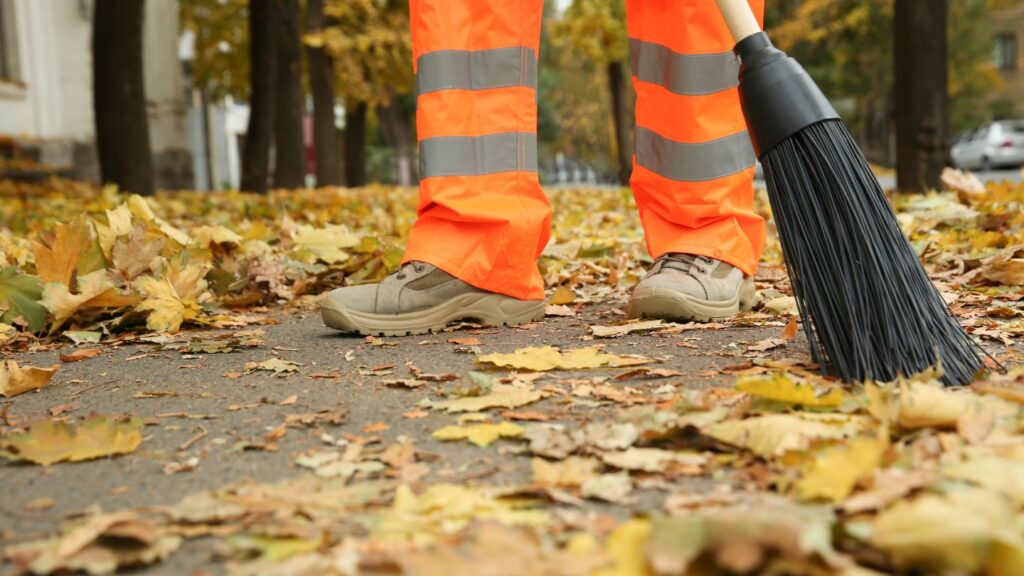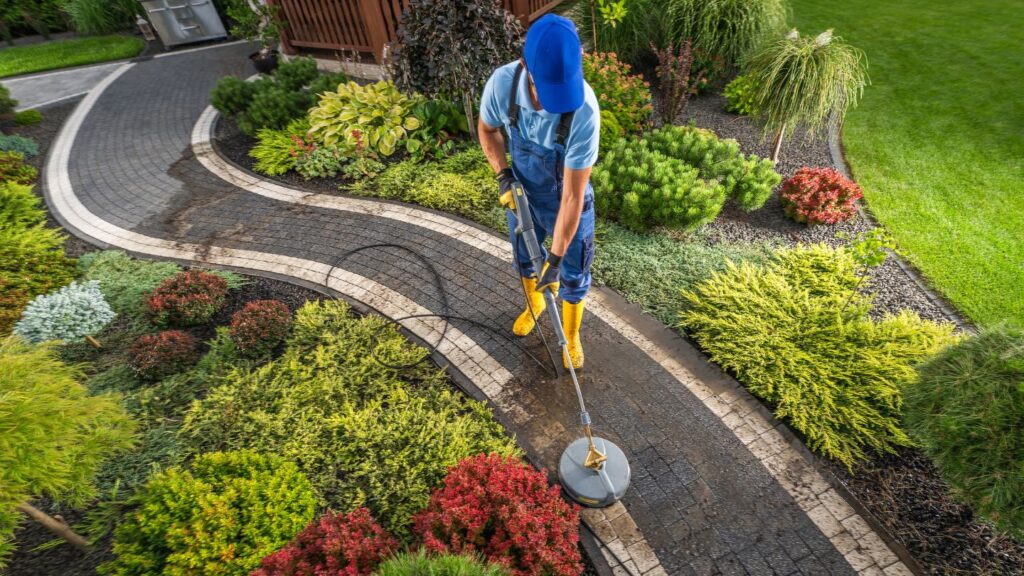What Are the Responsibilities of Groundskeeper in an Apartment?

Groundskeepers are responsible for maintaining outdoor spaces in apartment complexes. They keep the areas clean, safe, and visually appealing by handling tasks like trash removal, landscaping, and seasonal maintenance. This blog will explore their duties in detail and the skills required for the groundskeeper role.
Key Takeaways
- Groundskeepers are responsible for maintaining outdoor spaces, ensuring cleanliness, safety, and visual appeal through tasks like trash removal and landscaping.
- Specialized duties such as seasonal maintenance, minor repairs, and pest control are essential for groundskeepers to ensure property upkeep and safety.
- Training and experience, while formal education is not mandatory, greatly enhance job prospects and career advancement opportunities for groundskeepers.
Core Responsibilities of an Apartment Groundskeeper
The central duty of a groundskeeper involves the upkeep and maintenance of an apartment community’s outdoor areas. These committed individuals, holding the job title of groundskeeper, are responsible for ensuring that these spaces remain tidy, secure, and aesthetically pleasing to provide an enjoyable setting for both residents and guests.
Entrusted with various tasks critical to the care of the property, groundskeepers engage in activities like disposing of trash, as well as establishing and maintaining gardens and lawns. This job entails numerous duties that collectively contribute significantly to not just the visual appeal but also the practical usability of the apartment complex surroundings.
Maintaining Outdoor Spaces
Ensuring outdoor spaces are tidy and visually attractive is a key component of the groundskeeper’s role. Essential maintenance tasks like clearing snow in winter months and gathering fallen leaves during autumn contribute significantly to both the appeal and security of the property’s exterior.
Vigilance in spotting areas that have been overlooked or need upkeep is crucial, guaranteeing that every segment of the property remains orderly and well-maintained. It is their precise focus on detail that sustains an inviting atmosphere across all outdoor areas year-round.
Landscaping Tasks
The job description for a groundskeeper emphasizes the pivotal task of landscaping, which encompasses responsibilities like nurturing plants, cutting grass, and preserving the vitality of outdoor environments. The role mandates that groundskeepers undertake both the creation and upkeep of diverse exterior elements such as gardens and lawns. Sculpting trees and bushes to augment aesthetic allure.
Adeptness with hand tools is essential for fulfilling the duties associated with a groundskeeper’s job effectively. This proficiency enables them to manage their tasks skillfully, ensuring all maintenance aspects are covered in line with expectations laid out within a detailed groundskeeper job description.
Trash Removal
Groundskeepers are tasked with the crucial duty of eliminating trash, a responsibility that encompasses disposing of garbage from community spaces as well as empty apartments. By consistently carrying out this task, not only is the cleanliness of the property maintained, but it also provides a sanitary atmosphere for those living there.
It is essential to be vigilant in clearing away trash and debris to preserve both the hygiene and attractiveness of external areas on the property.
Specialized Groundskeeper Job Duties
To their fundamental duties, groundskeepers engage in specialized tasks that demand advanced skills and meticulous care. Seasonal upkeep, small-scale repairs, and managing pest infestations are crucial for sustaining the overall state of the premises.
As part of their responsibilities, these maintenance professionals frequently collaborate with fellow employees, landscape architects, and clients. The importance of robust interpersonal communication abilities and collective effort cannot be overstated. Groundskeepers’ problem-solving acumen and adept time management capabilities guarantee that all job requirements are executed with proficiency.
Seasonal Maintenance
Groundskeepers are tasked with essential seasonal maintenance duties that change with the year to keep the property safe and visually attractive. During winter months, they focus on clearing snow from pathways and communal spaces for safety, while autumn tasks include raking leaves to protect the grass from being smothered and maintaining the property’s aesthetic appeal.
The removal of debris and trash is also a critical part of their role in preserving a tidy and hazard-free setting throughout all seasons.
Repair and Upkeep
Groundskeepers bear the responsibility for maintaining and repairing outdoor facilities, taking care to make sure that features like benches and playground structures remain in prime condition and are safe for public use. Their duties involve conducting minor repairs and upkeep of exterior furnishings, necessitating sharp attention to detail to spot any potential problems early on so they can be rectified swiftly.
The adeptness of groundskeepers with diverse hand tools is crucial, as it allows them to execute these repair tasks proficiently.
Pest Control
Groundskeepers have the specialized responsibility of identifying and treating pest issues, which is pivotal in maintaining a secure and hygienic setting for residents. By implementing successful pest management tactics, they help to safeguard both the property itself and the well-being of its inhabitants against infestations.
Skills and Qualifications for Groundskeepers

In the position of a groundskeeper, it’s essential for one to have a diverse set of abilities and prerequisites. Utilizing different hand tools and machinery with ease, showing proactive behavior, and contributing efficiently as a member of a team are key competencies. For effective coordination with peers and engagement with residents, robust communication skills are indispensable.
Diligence and enthusiasm for acquiring new knowledge about maintaining outdoor properties are crucial in this role—this becomes particularly important when faced with challenges such as labor shortages. Although there’s typically no formal education required to become proficient at groundskeeping tasks, some community colleges do offer specialized programs that can enrich one’s expertise in this field.
Physical Stamina and Endurance
The role of a groundskeeper necessitates substantial physical resilience and vigor, given that the position is characterized by a multitude of tasks that are physically challenging. Groundskeepers must possess the endurance necessary to carry out their maintenance responsibilities effectively, which includes landscaping.
It’s essential for groundskeepers to manage prolonged periods of work outside, enduring different weather scenarios, in order to preserve the aesthetic appeal and operational condition of the properties they maintain.
Use of Hand Tools
Groundskeepers must be adept at using both hand tools and power equipment to execute various maintenance tasks efficiently. Their skill set encompasses the operation of essential landscaping tools, including shovels, mowers, and leaf blowers, that are vital for upkeep in outdoor areas.
It is crucial for groundskeepers to possess proficiency with particular hand tools such as soil probes and digital moisture meters. Mastery of these instruments ensures that they can provide the necessary attention to maintain the property effectively.
Attention to Detail
Maintaining a property’s curb appeal and operability is achieved through the vigilant oversight of groundskeepers, who are adept at identifying items or spots that require attention. Their scrupulous methods foster an inviting atmosphere for those residing on the premises.
Groundskeepers also shoulder the responsibility of executing efficient pest control strategies to protect against invasions by unwanted pests, thereby preserving a hygienic habitat for residents.
Training and Experience Needed
Pursuing a new job as a groundskeeper hinges significantly on receiving proper training and garnering experience. Minimal formal education is typically required, yet gaining on-the-job training along with acquiring state certification frequently serves as the preferred route for prospective groundskeepers. Hands-on experience obtained through entry-level roles can prove to be extremely beneficial, and possessing a high school diploma may bolster one’s chances in the competitive job market by making an applicant more appealing.
To obtain a position in groundskeeping, it’s essential to have an impressive resume that showcases pertinent skills and past experiences effectively.
Entry-Level Opportunities
Opportunities at the entry level for groundskeeping typically include responsibilities in maintenance, upkeep, and client interaction, offering an essential base to accrue pertinent experience. In the United States alone, there exists a substantial number of groundskeeper positions exceeding 900,000, presenting numerous chances for individuals looking to join this profession.
By working alongside seasoned professionals, novice groundskeepers have the chance to hone their skills and gain assurance in their capacity to perform their duties effectively.
High School Diploma Benefits
Possessing a high school diploma may not be strictly necessary, but it substantially improves the employment opportunities for groundskeepers. It provides an edge to applicants and broadens their chances of progressing in their careers.
A high school diploma is frequently regarded by employers as an indicator of fundamental academic achievement and dependability.
Building Your Resume
For those seeking a job as groundskeepers, creating an impactful resume is crucial. Accentuating pertinent abilities and customizing the resume to align with the requirements of job postings can greatly enhance prospects of employment. Including information about the salary range can also be beneficial to attract potential employers.
Focusing on particular experiences and credentials that are directly applicable to the position in groundskeeping can help applicants distinguish themselves amidst a crowded field of job seekers.
Career Advancement in Groundskeeping

The field of groundskeeping presents several avenues for professional development, with possibilities ranging from stepping up to supervisory positions to ascending into managerial roles. Attaining certifications such as the Certified Grounds Technician (CGT) and Landscape Industry Certified Technician can bolster credentials and pave the way for upward movement in one’s career.
Opportunities for Promotion
Advancements in the field can elevate groundskeepers to roles that require more oversight or specialized skills, increasing both their duties and remuneration. Pursuing qualifications such as Certified Grounds Manager may also enhance career prospects and foster professional growth.
Such progression offers groundskeepers opportunities for greater involvement in the property management sector, allowing them to assume increased responsibilities and play a more substantial role.
Additional Certifications
Certifications significantly enhance the career progression of groundskeepers, rendering them more attractive candidates in the employment arena. Ascending to roles like lead groundskeeper or positions centered on particular initiatives provides them with increased responsibilities and prospects for occupational development.
Summary
Groundskeepers play a crucial role in maintaining the appeal and functionality of apartment complexes. From landscaping and outdoor maintenance to specialized tasks like seasonal upkeep and pest control, their work ensures residents enjoy a clean, attractive, and well-maintained living environment. With a combination of physical skills, attention to detail, and on-the-job training, groundskeepers contribute significantly to creating welcoming spaces for all.
At OnSite Property Solutions, we understand the importance of skilled groundskeeping in property management. As a trusted property management temp agency serving Atlanta, we connect apartment complexes with experienced groundskeepers who are ready to deliver exceptional results. Whether you need temporary staffing or ongoing support, our team is here to meet your needs with top-notch service. Need expert groundskeeping services? Contact us to learn how we can help maintain and elevate your property.
Frequently Asked Questions
What does groundskeeping involve?
Groundskeeping involves maintaining land for aesthetic and functional purposes, which includes tasks such as mowing grass, trimming hedges, and planting flowers.
This work is essential in enhancing the appearance and usability of institutional spaces.
What are the duties of a grounds worker?
A grounds worker is responsible for maintaining green spaces by mowing, edging, fertilizing, and pruning vegetation, as well as operating various landscaping tools and equipment.
Their duties ensure that landscapes remain attractive, orderly, and safe for clients and the community.
What are the primary responsibilities of an apartment groundskeeper?
The primary responsibilities of an apartment groundskeeper involve maintaining outdoor areas, performing landscaping tasks, and ensuring thorough trash removal to keep the property clean, safe, and visually appealing.
What skills are essential for a successful groundskeeper?
In order to excel as a groundskeeper, it is essential to have physical endurance, be skilled in the use of hand tools, possess meticulous attention to detail, and demonstrate robust communication abilities along with effective teamwork.
The acquisition and application of these competencies are vital for the exemplary execution of duties within this position.
How can a high school diploma benefit a groundskeeper’s career?
Possessing a high school diploma can notably boost the employment prospects and competitive edge for someone pursuing a career as a groundskeeper, subsequently facilitating better chances for professional growth.
With this credential, individuals are more likely to gain access to positions that offer higher salaries and allow them to specialize within the profession.

